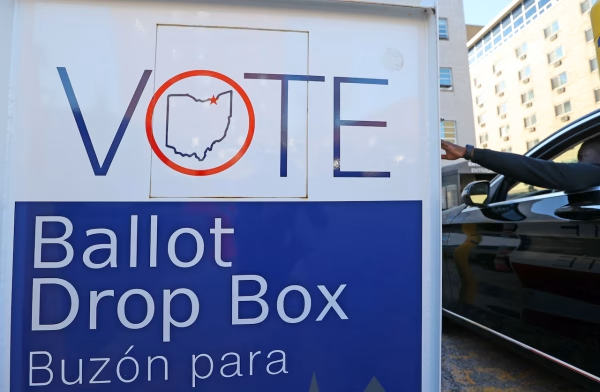Voting and Civil Rights Advocates File Amicus Brief in Lawsuit Challenging Ohio’s New Ballot Drop Box Requirements
COLUMBUS, Ohio — The American Civil Liberties Union and ACLU of Ohio filed an amicus brief today to the Ohio Supreme Court on behalf of the League of Women Voters of Ohio and the Ohio chapter of the NAACP in a lawsuit challenging Secretary Frank LaRose’s new directive curtailing the use of drop boxes.
This burdensome and unnecessary directive (2024-21) deprives everyone who is lawfully assisting another voter from using a drop box, mandating that this method may be used only by voters who are returning their own ballot.
This directive was issued soon after a federal court decision in late-July that struck down restrictions in Ohio’s House Bill 458, which had made it a felony for all but a handful of family members to assist voters with disabilities in casting absentee ballots.
The initial challenge to HB 458 was brought by the ACLU, ACLU of Ohio, and Covington & Burling in December 2023, on behalf of the LWV-Ohio. LaRose has tried to use his loss in that case as a shield to justify his new effort to make drop boxes harder for all Ohioans to use. But nothing in the district court’s narrow, targeted ruling to protect the right to vote for Ohioans with disabilities made Ohio elections less safe or secure, nor did the district court’s order that Ohio comply with federal law justify LaRose’s imposition of new hurdles for Ohio voters and election officials.
“Secretary LaRose’s frantic alteration of the rules for voting in the upcoming election is hastily-conceived and logistically-fraught. The new requirements will likely disenfranchise voters who will not learn, until too late, of the last-minute changes. For other voters, as well as those legally authorized to assist them, the directive is intimidating, confusing and difficult to comply with. It must be rescinded immediately,” said Freda Levenson, legal director for the ACLU of Ohio.
“The court should put a stop to Secretary LaRose’s last-minute directive, which inflicts wholly unnecessary harm on Ohio voters and election officials. His latest effort to restrict Ohioans’ access to drop boxes will create confusion and unnecessary barriers for voters and rack up new processing and staffing difficulties for election officials, all just weeks before the start of absentee voting in Ohio,” said Megan Keenan, a staff attorney with the ACLU’s Voting Rights Project.
“People with disabilities, seniors, and voters of all walks of life prefer having a loved one deliver their absentee ballots to the drop box, because it is more direct than mail,” said Jen Miller, executive director of the League of Women Voters of Ohio. “This directive has no added security benefits but does create unnecessary work for elections officials and unreasonable barriers for voters. We call on the court to stand with voters by ensuring greater access to the one drop box in each Ohio county.”
“This mandate is a direct assault on the rights of voters with disabilities and others who face barriers to physically delivering their vote,” said NAACP Ohio State Conference President Tom Roberts. “It completely disregards the principle of accessibility and imposes a burden on those who rely on help to make their voices heard. We must ensure that all voters have equal access to the ballot without discriminatory restrictions.”
The organizations encourage the court to order the secretary to rescind Directive 2024-21 and inform county election officials to accept absentee ballots from authorized individuals without requiring an attestation form, including via a drop box.
The brief is online.





